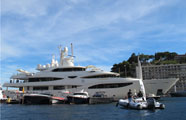|
|||||||||||
CALMING NERVES
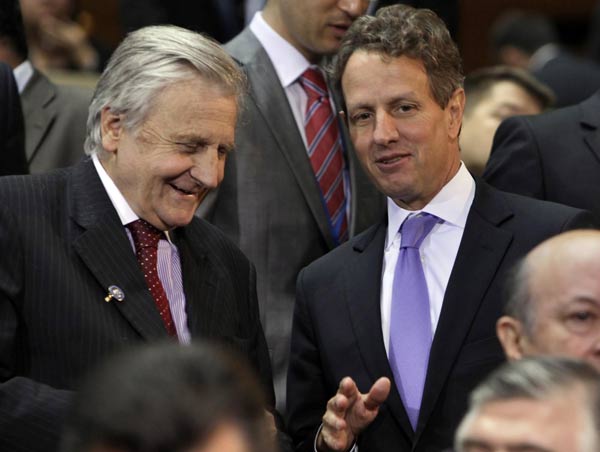 |
|
US Treasury Secretary Timothy Geithner (R) talks to European Central Bank President Jean-Claude Trichet during a family photo before the International Monetary and Financial Committee (IMFC) meeting during the annual IMF-World Bank meetings in Washington September 24, 2011. [Photo/Agencies] |
Investors took some comfort on Friday from signs of new resolve by European officials, after nearly two years of what many saw as half-hearted action.
"It is encouraging that ... European officials are signaling a better appreciation of the depth and potential consequences of the crisis," Mohamed el-Erian, co-chief investment officer of bond giant PIMCO, said on Saturday after further signals that Europe was bolstering its defenses.
"Now they need to translate this into decisive actions underpinned by a common vision of what they want the euro zone to look like in five years time."
Some policymakers now talk openly of a possible Greek default and the need to move much more aggressively to prepare for it.
"Decisions as to how to conclusively address the region's problems cannot wait until the crisis gets more severe," Geithner said.
His warning was echoed by China's central bank governor, Zhou Xiaochuan, who urged quick action to bring greater financial stability to the Europe.
Canada's central bank governor, Mark Carney, told Canadian radio that the euro area's bailout fund should be more than doubled to "the neighborhood of a trillion euros."
BATTENING THE HATCHES
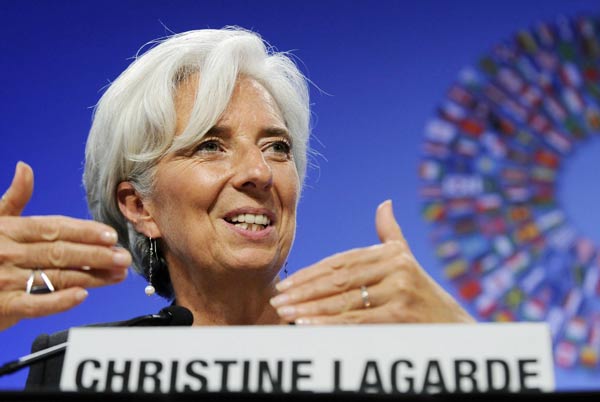 |
|
International Monetary Fund (IMF) Managing Director Christine Lagarde answers questions during a Development Committee news conference at the IMF-World Bank Annual Meetings in Washington September 24, 2011. [Photo/Agencies] |
A default by Greece could cause a domino effect in other highly indebted euro zone countries, putting at risk European banks which hold their debt.
Greek Finance Minister Evangelos Venizelos said Athens was determined not to default and would stay in the euro zone.
"Greece will always be in the euro and Greece will never go bankrupt because this would be destructive for the euro zone and for many other countries beyond the euro zone," he said.
Athens is in tense talks with the IMF and European authorities to secure a new 8 billion-euro installment of its rescue package.
In return, it has pledged deep austerity measures but negotiators are frustrated at what they say is Greece's slow reform pace. A loan payment, however, is still expected to be made in October. The next installment is due in December.
Venizelos was quoted by two newspapers on Friday as saying an orderly default with a 50 percent "haircut" for bondholders was one way to resolve the heavily indebted euro zone nation's cash crunch. European banks have agreed to take a 21 percent loss on their Greek bonds in a restructuring deal.
To battle the crisis, Geithner called for more cooperation between European policymakers -- who set their own tax and fiscal policy -- and their central bank.
One option to increase the potency of the EFSF would be for the ECB to commit large amounts of funding, with the temporary bailout fund putting forward money to cover potential losses.
German Finance Minister Wolfgang Schaeuble said he was open to the idea of leveraging Europe's rescue fund but said that did not necessarily mean the ECB should provide the extra firepower.
In another sign of new thinking by Europe, Schaeuble said Germany backed bringing forward the launch of the euro zone's permanent rescue mechanism, which is currently scheduled for mid-2013. The new mechanism would give policymakers powers to impose losses on private bondholders in a default and could be leveraged more easily than the temporary version of the fund.
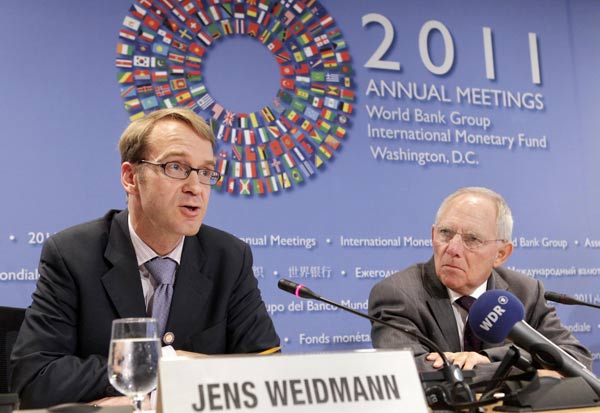 |
|
Germany's finance minister Wolfgang Schaeubleat (R) and Bundesbank President Jens Weidmann hold a news conference during the annual IMF-World Bank meetings in Washington September 24, 2011. [Photo/Agencies] |
Germany, as the strongest economy in Europe, needs to play a central role in any effort to curb a debt crisis, but public opinion there has turned against further big bailouts for fellow euro zone countries.
Schaeuble stuck to Germany's insistence that austerity was the cure for the crisis. "You can't cure an alcoholic by giving him alcohol ... The main reason for the lack of demand is the lack of confidence," he said.
Hot Topics
Libya conflict, Gaddafi, Oil spill, Palace Museum scandal, Inflation, Japan's new PM, Trapped miners, Mooncake tax, Weekly photos, Hurricane Irene
Editor's Picks

|

|
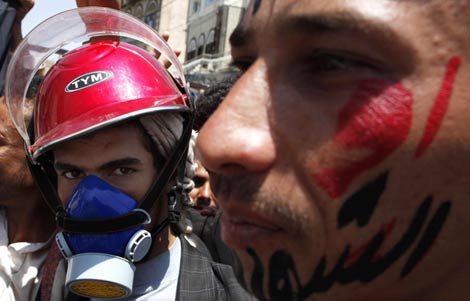
|

|

|

|


